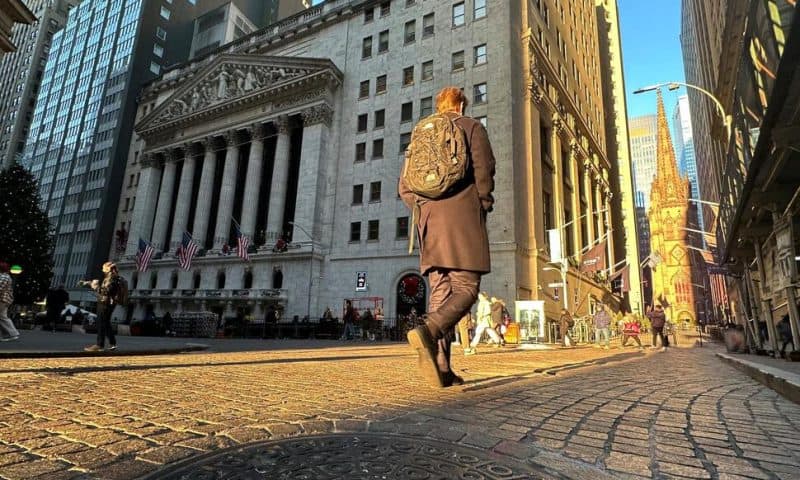U.S. stock indexes rose to more records after tech companies talked up how much artificial intelligence is boosting their results
NEW YORK — U.S. stock indexes rose to more records Wednesday after tech companies talked up how much of a boost they’re getting from the artificial-intelligence boom.
The S&P 500 climbed 0.6% to add to what’s set to be one of its best years of the millennium. It’s the 56th time the index has hit an all-time high this year after climbing in 11 of the last 12 days.
The Dow Jones Industrial Average rose 308 points, or 0.7%, while the Nasdaq composite added 1.3% to its own record.
Salesforce helped pull the market higher after delivering stronger revenue for the latest quarter than analysts expected, though its profit fell just short.
CEO Mark Benioff highlighted the company’s artificial-intelligence offering for customers, saying “the rise of autonomous AI agents is revolutionizing global labor, reshaping how industries operate and scale.” The stock price of the company, which helps businesses manage their customers, jumped 11%.
Marvell Technology leaped even more after delivering better results than expected, up 23.2%. CEO Matt Murphy said the semiconductor supplier is seeing strong demand from AI and gave a forecast for profit in the upcoming quarter that topped analysts’ expectations.
All the optimistic talk helped Nvidia, the company whose chips are powering much of the move into AI, rally 3.5%. It was the strongest force pushing upward on the S&P 500 by far.
They helped offset an 8.9% drop for Foot Locker, which reported profit and revenue that fell short of analysts’ expectations.
CEO Mary Dillon said the company is taking a more cautious view, and it cut its forecasts for sales and profit this year. Dillon pointed to how keen customers are for discounts and how soft demand has been outside of Thanksgiving week and other key selling periods.
Retailers overall have offered mixed signals about how resilient U.S. shoppers can remain. Their spending has been one of the main reasons the U.S. economy has avoided a recession that earlier seemed inevitable after the Federal Reserve hiked interest rates to crush inflation. But shoppers are now contending with still-high prices and a slowing job market.
This week’s highlight for Wall Street will be Friday’s jobs report from the U.S. government, which will show how many people employers hired and fired last month. A narrower report released Wednesday morning suggested employers in the private sector increased their payrolls by less last month than economists expected. Hiring in manufacturing was the weakest since the spring, according to Nela Richardson, chief economist at ADP.
The report strengthened traders’ expectations that the Fed will cut its main interest rate again when it meets in two weeks.
The Fed began easing its main interest rate from a two-decade high in September, hoping to offer more support for the job market. The central bank had appeared set to continue cutting rates into next year, but the election of Donald Trump has scrambled Wall Street’s expectations somewhat. Trump’s preference for higher tariffs and other policies could lead to higher inflation, which could alter the Fed’s plans.
Fed Chair Jerome Powell said Wednesday that the central bank can afford to cut rates cautiously because inflation has slowed from its peak two years ago and the economy remains sturdy.
A separate report on Wednesday said health care, finance and other businesses in the U.S. services sector are continuing to grow, but not by as much as before and not by as much as economists expected.
One respondent from the construction industry told the survey from the Institute for Supply Management that the Fed’s rate cuts haven’t pulled down mortgage rates as much as hoped. Plus, “the unknown effect of tariffs clouds the future.”
In the bond market, the yield on the 10-year Treasury fell to 4.18% from 4.23% late Tuesday.
On Wall Street, Campbell’s sank 6.2% for one of the S&P 500’s sharper losses despite increasing its dividend and reporting a stronger profit than analysts expected. Its revenue fell short of Wall Street’s expectations, and the National Football League’s Washington Commanders hired Campbell’s CEO Mark Clouse as its team president.
Gains for airline stocks helped offset that drop after JetBlue Airways said it saw stronger bookings for travel in November and December following the presidential election. It also said it’s benefiting from lower fuel prices, as well as lower costs due to improved on-time performance.
JetBlue jumped 8.3%, while Southwest Airlines climbed 3.5%.
All told, the S&P 500 rose 36.61 points to 6,086.49. The Dow climbed 308.51 to 45,014.04, and the Nasdaq composite rallied 254.21 to 19,735.12.
In stock markets abroad, South Korea’s Kospi sank 1.4% following a night full of drama in Seoul.
President Yoon Suk Yeol was facing possible impeachment after he suddenly declared martial law on Tuesday night, prompting troops to surround the parliament. He revoked the martial law declaration six hours later.
In the crypto market, bitcoin climbed near $99,000 after Trump said he would nominate Paul Atkins, a cryptocurrency advocate, to chair the Securities and Exchange Commission.

